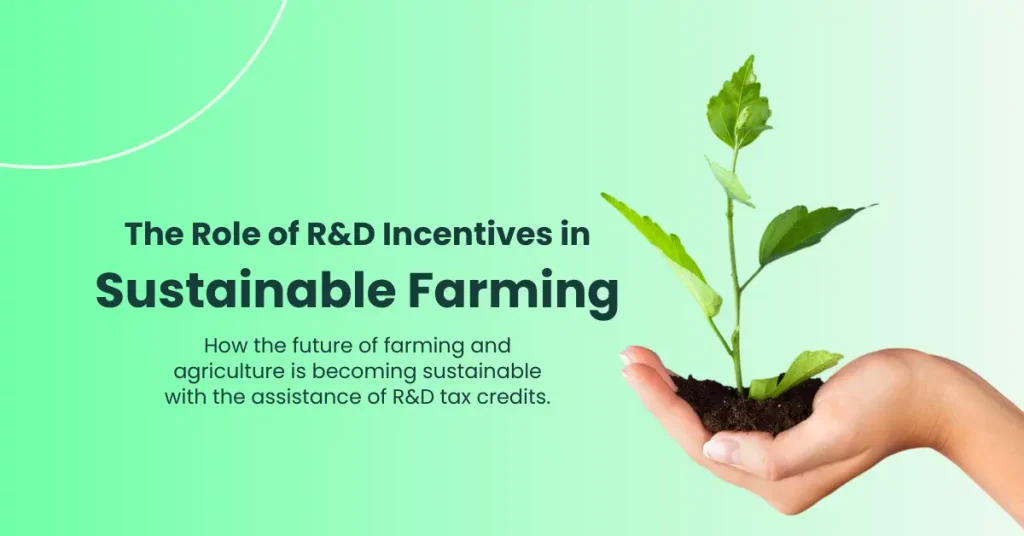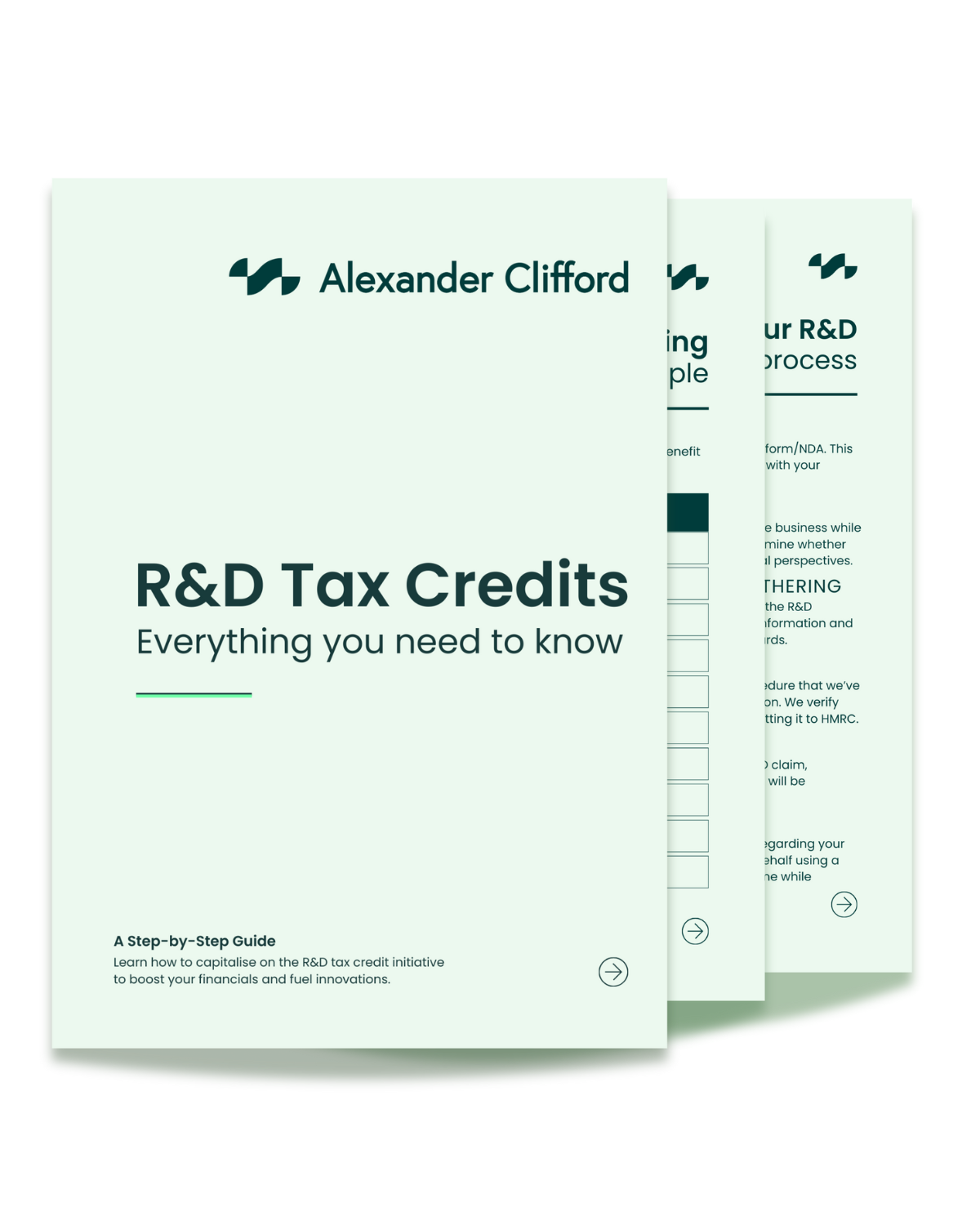The Role of R&D Incentives in Sustainable Farming

Understand the role that R&D tax credits play in the research and development of sustainable British farming, and how industry trends will lead to a greener future. Learn about the innovative future of agriculture and how R&D incentives will play a role in their success throughout the UK.
Over the years, the world has taken advantage of a budget approach to farming and agriculture. But while this may have been great for the consumer, the impact that these practices have on our environment are becoming somewhat unmanageable.
In a rush to slow the impact of recent practices, farmers around the world are opting to turn towards more sustainable farming practices, which in turn protects their livelihood and the wellbeing of the wide communities that rely on them. The problem with this however is that there appears to be a significant lack in modernisation as far as sustainable agriculture is concerned.
So in an urge to bring farming into the 21st century and to further the exploration into farming in rapidly changing climates, research and development is becoming an industry standard. And where there is research and development, there is an opportunity to explore the power of R&D tax credits, and how they can help to offset the financial burden of innovation.
Importance of Sustainable Farming
Sustainable farming is important for ensuring the long term health of our environment, economy, and food systems in the UK.
But with a rapidly changing climate, the challenges that face the agriculture industry are rapidly increasing, providing a significant opportunity for innovative minds.
Current Research and Development Trends in Sustainable Agriculture
Applying innovative thinking to research and development that provides sustainable solutions to the farming community is now a necessity that allows farmers to reduce the environmental impact of their work, while often increasing production.
To highlight the importance of sustainable agriculture research and development, the following are current trending projects that are already having a positive impact across the industry:
- Regenerative agriculture practices
- Precision farming technology
- Vertical farming innovations
- Development of drought-resistant crops
The idea behind these projects is to improve the long term productivity of farms that remains fruitful even among challenges imposed by climate change.
Future of Sustainable Agriculture
Before exploring the future of sustainable agriculture, we must first explore the requirements of the industry as a whole. Three of the greatest challenges that British farmers currently face are:
- Climate change and extreme weather
- Soil degradation and nutrient depletion
- Pest and disease management
With these in mind, innovative businesses within the agricultural industry are working hard to provide helpful solutions that face these challenges head on.
Innovative Future Trends in Sustainable Agriculture
While there are research and development projects focusing on overcoming the aforementioned challenges, there are a range of broader projects that are set to position early adopters of innovation as industry leaders. Over the next few years, the farming community can expect to see advances being made in:
- Exploration of AI for predictive farming
- Carbon storing methods in agriculture
- Bio-based pesticides and herbicides
As businesses throughout the agricultural industry continue to invest in research and development that fuels sustainable farming practices, the question becomes how they manage to finance their innovative advancements. This is where R&D tax credits come in.
Benefits of R&D Tax Credits in Sustainable Farming and Agriculture
R&D tax credits play a pivotal role in propelling innovation within the agricultural sector, offering farmers essential support to enhance their practices and contribute to a more sustainable future.
How R&D Tax Credits Support Agricultural Innovation
By providing access to funding sources, these financial incentives empower businesses to explore and implement sustainable practices that have a lasting environmental impact, while enabling innovative agricultural businesses to:
- Advance agricultural technology that reduces waste and increases efficiency
- Collaborate with fellow farmers
- Safeguard the environment through responsible farming
- Boost economic viability by adopting forward thinking methods
R&D tax credits therefore aren’t just financial support, but they represent a commitment to a greener, more sustainable future. By investing in research and development, farmers and other agricultural businesses can lead the charge towards a more resilient agricultural sector, ensuring that practices benefit both communities and the environment.
Frequent Challenges in Agricultural Research and Development
Despite the amount of support that R&D tax credits are able to provide for innovative businesses throughout the agricultural sector, we would be remiss to say that research and development isn’t without its challenges.
The following table highlights some of the frequent challenges in agricultural research and development, and how to overcome them to advance your own R&D projects.
| R&D Challenge | Solution |
| Lack of specialised expertise | Collaborate on projects with universities, research institutions and experts in the field |
| Technological adoption | Provide demonstrations and training to showcase the benefits of the developed technology |
| Data management | Adopt user friendly data collection tools that aid in simplifying data |
| Regulatory hurdles | Engage with policy makers and keep on top of legislation to ensure that R&D activities align with regulatory requirements, and advocate for supportive policies |
| Farmer engagement | Involve farmers directly in your R&D project to get accurate feedback, and fuel participatory research |
Claiming R&D Tax Credits
Before claiming R&D tax credits, it’s important to understand a little more about them. This financial incentive is run by the HMRC, meaning it’s crucial that you are not only aware of the documentation process, but that you understand the ins and outs of eligibility.
R&D Tax Credits Eligibility for Agricultural Businesses and Farmers
The R&D tax credit schemes were initially introduced for businesses to advance their industries through innovative advancement. To ensure that this remains the case, claimants must meet the following criteria:
- Be liable to pay corporation tax
- Be engaging in industry related research and development activities
- Be spending on these activities
Qualifying Activities and Costs for Agricultural R&D Tax Credits
In order to further understand these criteria, it’s important to note that HMRC has an incredibly specific definition of what constitutes research and development. In the eyes of the British government, research and development is a project that seeks to do one of two things:
- Make a scientific or technological advance
- Overcome a scientific or technological uncertainty
With that in mind, the scope for eligible activities remains quite broad – especially as far as sustainable agriculture is concerned.
What isn’t so broad are the eligible costs, although they still offer a significant return on investment into research and development projects. The following is a list of qualifying R&D tax credit expenditure for sustainable agriculture businesses:
- Internal and external R&D staff costs
- Subcontracted R&D
- Consumable items
- Software used in R&D
Large companies may also be able to claim the cost of contributions that are made to other research and development projects, however these contributions must be made to what’s considered to be a qualifying body, such as a scientific research organisation, charity or a higher education facility.
To summarise, businesses throughout the agricultural industry could see an influx of benefits from their investment in sustainable research and developments. Not only could they witness a positive impact ripple through the industry, they would also set themselves as solid competitors on a global scale.
Collaborative projects between smaller farming and agricultural businesses could have an even greater impact given their ability to share industry expertise and practices.
And finally, with the use of R&D tax credits, businesses large and small have the ability to explore sustainable farming practices without facing the financial burden that research and development typically provides.
How Alexander Clifford Can Help With R&D Tax Credits
With over 2,400 successfully submitted claims, Alexander Clifford has a proven track record of simplifying the R&D tax credits claims process.
Our experts actively seek out the latest information in regards to tax credits policy so that they may spearhead your claims process with confidence and compliance.
For more information on how Alexander Clifford can simplify your R&D tax credits claim process, fill in the contact form below and one of our experts will be in touch within 30 minutes.







